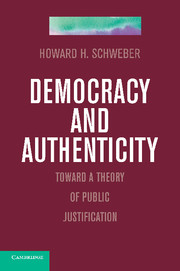Book contents
- Frontmatter
- Contents
- 1 Introduction
- Part One The Case for Constraint
- 2 Three Versions of the Case for Constraint
- 3 Subjective Standards and the Problem of Deliberative Perfectionism
- 4 Liberalism and the Problem of Authenticity
- 5 Further Reflections on Authenticity
- 6 The Scope of Constraint
- Part Two Responding to the Case for Inclusion
- Bibliography
- Index
- References
6 - The Scope of Constraint
from Part One - The Case for Constraint
Published online by Cambridge University Press: 05 November 2011
- Frontmatter
- Contents
- 1 Introduction
- Part One The Case for Constraint
- 2 Three Versions of the Case for Constraint
- 3 Subjective Standards and the Problem of Deliberative Perfectionism
- 4 Liberalism and the Problem of Authenticity
- 5 Further Reflections on Authenticity
- 6 The Scope of Constraint
- Part Two Responding to the Case for Inclusion
- Bibliography
- Index
- References
Summary
At this point, a review of the argument thus far is in order. I began by setting out the project in terms of the development of a version of the theory of public reason applicable to coercive state actions that is consistent with the principles of consensus liberalism: a limited state, basic equality, and individual freedom. Right from the beginning, that commitment led to a recognition of the need to distinguish between preference aggregation (voting, representation), preference expression (the public assertion of justifications for state actions), and preference formation (the combination of social experiences and interactions that lead to the subjectively held beliefs and preferences of individual citizens). The project, thus defined, is limited in its scope. The theory of public justification is not intended as a complete theory of liberalism or an exhaustive statement of the norms that might influence our understandings of what constitutes the most desirable forms of political dialogue. The question, instead, has to do with the case for constraint. What are the limitations on permissible justifications for state action that are consistent with consensus liberalism, and what are the strongest forms of the arguments in favor of those limitations?
To address these questions, I considered arguments from consequences, fairness, and epistemology. The arguments from consequences focused on the fear that allowing certain kinds of justifications for coercive state actions to be offered in public political dialogue would lead to a form of faux “dialogue” consisting of the assertion of mutually incomprehensible positions. The negative political consequences to be feared are that instead of dialogue, the result would be nothing more than competing assertions of allegiance, a situation that reduces democracy to the mere aggregation of preferences, a bare competition for power. Worse, in such a situation, the institutional mechanisms of preference aggregation lose their capacity to ensure that minorities will ever have a meaningful hope for success, with the result that majoritarian domination is built into the system. Where “the machinery of the state” is available for the imposition of sectarian, incommunicable norms on nonadherents, those nonadherents no longer have any reason to feel any sense of ownership with respect to the system of decision making, let alone particular policy outcomes. Audi's description of the justified “resentment” felt by unwilling listeners captured this concern. The prevention of such a situation is precisely the point at which consensus liberalism requires something more than the mere form of democratic decision making.
- Type
- Chapter
- Information
- Democracy and AuthenticityToward a Theory of Public Justification, pp. 163 - 202Publisher: Cambridge University PressPrint publication year: 2011



